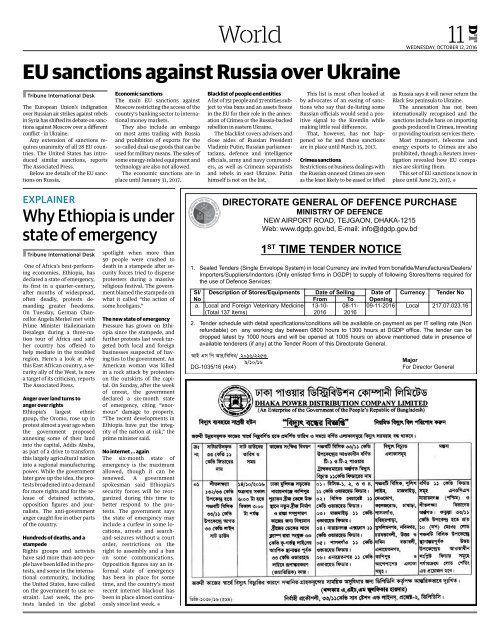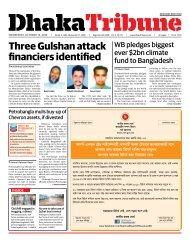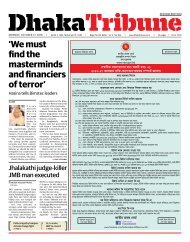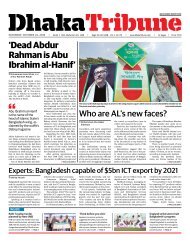ePaper_2nd Edition_October 12, 2016
Create successful ePaper yourself
Turn your PDF publications into a flip-book with our unique Google optimized e-Paper software.
World<br />
EU sanctions against Russia over Ukraine<br />
11<br />
WEDNESDAY, OCTOBER <strong>12</strong>, <strong>2016</strong><br />
DT<br />
• Tribune International Desk<br />
The European Union’s indignation<br />
over Russian air strikes against rebels<br />
in Syria has shifted its debate on sanctions<br />
against Moscow over a different<br />
conflict - in Ukraine.<br />
Any extension of sanctions requires<br />
unanimity of all 28 EU countries.<br />
The United States has introduced<br />
similar sanctions, reports<br />
The Associated Press.<br />
Below are details of the EU sanctions<br />
on Russia.<br />
Economic sanctions<br />
The main EU sanctions against<br />
Moscow restricting the access of the<br />
country’s banking sector to international<br />
money markets.<br />
They also include an embargo<br />
on most arms trading with Russia<br />
and prohibition of exports for the<br />
so-called dual-use goods that can be<br />
used for military means. The sales of<br />
some energy-related equipment and<br />
technology are also not allowed.<br />
The economic sanctions are in<br />
place until January 31, 2017.<br />
Blacklist of people end entities<br />
A list of 151 people and 37 entities subject<br />
to visa bans and an assets freeze<br />
in the EU for their role in the annexation<br />
of Crimea or the Russia-backed<br />
rebellion in eastern Ukraine.<br />
The blacklist covers advisers and<br />
close aides of Russian President<br />
Vladimir Putin, Russian parliamentarians,<br />
defence and intelligence<br />
officials, army and navy commanders,<br />
as well as Crimean separatists<br />
and rebels in east Ukraine. Putin<br />
himself is not on the list.<br />
This list is most often looked at<br />
by advocates of an easing of sanctions<br />
who say that de-listing some<br />
Russian officials would send a positive<br />
signal to the Kremlin while<br />
making little real difference.<br />
That, however, has not happened<br />
so far and these sanctions<br />
are in place until March 15, 2017.<br />
Crimea sanctions<br />
Restrictions on business dealings with<br />
the Russian-annexed Crimea are seen<br />
as the least likely to be eased or lifted<br />
as Russia says it will never return the<br />
Black Sea peninsula to Ukraine.<br />
The annexation has not been<br />
internationally recognised and the<br />
sanctions include bans on importing<br />
goods produced in Crimea, investing<br />
or providing tourism services there.<br />
Most transport, telecoms and<br />
energy exports to Crimea are also<br />
prohibited, though a Reuters investigation<br />
revealed how EU companies<br />
are skirting them.<br />
This set of EU sanctions is now in<br />
place until June 23, 2017. •<br />
EXPLAINER<br />
Why Ethiopia is under<br />
state of emergency<br />
• Tribune International Desk<br />
One of Africa’s best-performing<br />
economies, Ethiopia, has<br />
declared a state of emergency,<br />
its first in a quarter-century,<br />
after months of widespread,<br />
often deadly, protests demanding<br />
greater freedoms.<br />
On Tuesday, German Chancellor<br />
Angela Merkel met with<br />
Prime Minister Hailemariam<br />
Desalegn during a three-nation<br />
tour of Africa and said<br />
her country has offered to<br />
help mediate in the troubled<br />
region. Here’s a look at why<br />
this East African country, a security<br />
ally of the West, is now<br />
a target of its criticism, reports<br />
The Associated Press.<br />
Anger over land turns to<br />
anger over rights<br />
Ethiopia’s largest ethnic<br />
group, the Oromo, rose up in<br />
protest almost a year ago when<br />
the government proposed<br />
annexing some of their land<br />
into the capital, Addis Ababa,<br />
as part of a drive to transform<br />
this largely agricultural nation<br />
into a regional manufacturing<br />
power. While the government<br />
later gave up the idea, the protests<br />
broadened into a demand<br />
for more rights and for the release<br />
of detained activists,<br />
opposition figures and journalists.<br />
The anti-government<br />
anger caught fire in other parts<br />
of the country.<br />
Hundreds of deaths, and a<br />
stampede<br />
Rights groups and activists<br />
have said more than 400 people<br />
have been killed in the protests,<br />
and some in the international<br />
community, including<br />
the United States, have called<br />
on the government to use restraint.<br />
Last week, the protests<br />
landed in the global<br />
spotlight when more than<br />
50 people were crushed to<br />
death in a stampede after security<br />
forces tried to disperse<br />
protesters during a massive<br />
religious festival. The government<br />
blamed the stampede on<br />
what it called “the action of<br />
some hooligans.”<br />
The new state of emergency<br />
Pressure has grown on Ethiopia<br />
since the stampede, and<br />
further protests last week targeted<br />
both local and foreign<br />
businesses suspected of having<br />
ties to the government. An<br />
American woman was killed<br />
in a rock attack by protesters<br />
on the outskirts of the capital.<br />
On Sunday, after the week<br />
of unrest, the government<br />
declared a six-month state<br />
of emergency, citing “enormous”<br />
damage to property.<br />
“The recent developments in<br />
Ethiopia have put the integrity<br />
of the nation at risk,” the<br />
prime minister said.<br />
No internet ... again<br />
The six-month state of<br />
emergency is the maximum<br />
allowed, though it can be<br />
renewed. A government<br />
spokesman said Ethiopia’s<br />
security forces will be reorganized<br />
during this time to<br />
better respond to the protests.<br />
The government says<br />
the state of emergency may<br />
include a curfew in some locations,<br />
arrests and searchand-seizures<br />
without a court<br />
order, restrictions on the<br />
right to assembly and a ban<br />
on some communications.<br />
Opposition figures say an informal<br />
state of emergency<br />
has been in place for some<br />
time, and the country’s most<br />
recent internet blackout has<br />
been in place almost continuously<br />
since last week. •













